| |||||||||||||||||||||||||||||||||
| Getting Started | Facts > Triumph > Over Other Christianities |
| Hellenism | Syncretic Judaism | Jesus legend | Jesus Scholarship | |
|
|
Apostolic Legend | Apostolic Scholarship | Over Paganism | Over other Christianities |
| The
guys with with the swords decided what "Christian" is |
All heresies are forbidden
by both divine and imperial laws and shall forever cease. |
Constantine
and social Darwinism: Crushing Paganism
|
||||||||||||||||||||||||
|
"Who does not see how much the worship of the name of Christ has increased." [St. Augustine, Civ dei 18:45] |
Well, no kidding. |
"some persons have been discovered given over to the error of the unholy and wicked pagans, performing acts that stir a loving God, philanthropos, to just wrath, [who] offer sacrifice to insensate idols and celebrate festivals replete with every impiety, even persons who have already been judged worthy of holy baptism," who henceforth shall be executed. Justinian Code, 1.11.10—which you can find in: MacMullen, Ramsay, Christianity & Paganism in the Fourth to Eighth Centuries (1997), n 27, pg 182 |
Mauricius (582- 602)… saw to it that pagans were brought before the courts 'in every region of the city,' and in particular, in Carrhae-Harran. Here, the bishop…received the emperor's orders to institute a persecution. "Some he managed to convert to Christianity, while many who resisted he carved up, suspending their limbs in the main street of the town." [quoting PLRE 3 p. 974 sv] pg 28 MacMullen, Ramsay, Christianity & Paganism in the Fourth to Eighth Centuries (1997), pg. 27 |
|
[T]he bishops assembled in council (at Toledo in 681), like Firmicus quoting vengeful verses from Deuteronomy, called on the civil authorities to seize and behead all those guilty of non-Christian practices of whatsoever sort. MacMullen, Ramsay, Christianity & Paganism in the Fourth to Eighth Centuries (1997), pg. 16 |
Constantine
and social Darwinism: Crushing non-Roman Christianities
|
[I]n late antiquity, both secular and ecclesiastical authorities repeatedly destroyed unedifying texts, in well advertised ceremonies, ... that is, in great bonfires at the center of the town square. Copyists were discouraged from replacing them by the threat of having their hands cut off. MacMullen, Ramsay, Christianity & Paganism in the Fourth to Eighth Centuries (1997), pg. 4 |
|
"Whoever hides them [Arian's version of the New Testament] shall be condemned to death." |
||
|
|
|
|||||||||||||||||||
Diocletian's edict against Manicheans: |
"For we decree that the originators and leaders, together with their detestable writings, be subjected to a more stringent penalty, namely that they be consumed by fire, while we command that followers who persist in their adherence receive capital punishment, and we sanction the claiming of their property by our treasury." Comparison of the Laws of Moses and the Romans, 15.3—which you can find in: Lee, A.D., Pagans & Christians in Late Antiquity (2000), pg. 67 |
| |
What
other people think about POCM |
|
Hello: |
||
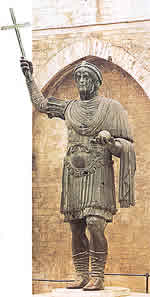
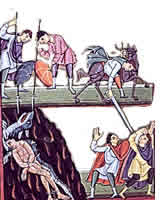 .
.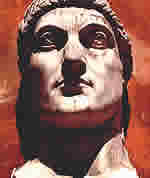

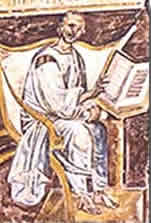
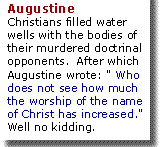
 Someone
recommended I check out your site, though I'm not sure why
now. I find it bizarre to say the least. Your category,
"Triumph how one Christianity—one version of many early Christianities—conquered
the Roman Empire, and suppressed all other religions, Pagan and Christian"
flies in the face of history. Christianity never conquered the
Roman Empire! It took 300 years for any emperor to even consider
it as a possibility; and when Constantine adopted it, it still took
centuries for Christianity to be considered "the" religion
of Europe. And through it all the Jews continued with
their religious beliefs, barely paying attention to this upstart sect.
And the Jewish religion was and is far more ancient than Christianity.
They exist to this day as you may (or may not?) know,
so the idea of Christianity "suppressing" all other religions
is ludicrous. The Nation of Islam with its 1 billion
members also seems to be faring quite well, as is Hinduism with its
700 million believers and Buddhism with its 200 million.
Someone
recommended I check out your site, though I'm not sure why
now. I find it bizarre to say the least. Your category,
"Triumph how one Christianity—one version of many early Christianities—conquered
the Roman Empire, and suppressed all other religions, Pagan and Christian"
flies in the face of history. Christianity never conquered the
Roman Empire! It took 300 years for any emperor to even consider
it as a possibility; and when Constantine adopted it, it still took
centuries for Christianity to be considered "the" religion
of Europe. And through it all the Jews continued with
their religious beliefs, barely paying attention to this upstart sect.
And the Jewish religion was and is far more ancient than Christianity.
They exist to this day as you may (or may not?) know,
so the idea of Christianity "suppressing" all other religions
is ludicrous. The Nation of Islam with its 1 billion
members also seems to be faring quite well, as is Hinduism with its
700 million believers and Buddhism with its 200 million.